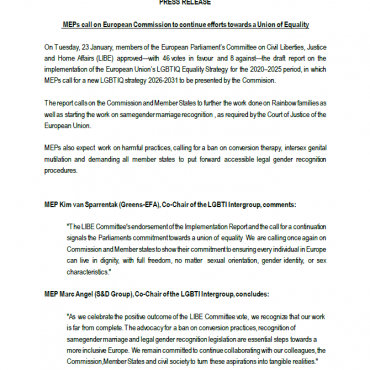Parliament speaks out for mutual recognition domestic adoptions
In a resolution addressing cross-border conflicts around adoption adopted yesterday, the Parliament has spoken out in favour of mutual recognition of domestic adoption decisions between Member States.
 Domestic adoption refers to the placement of a child for adoption by their birth parents with an adoptive family. The resolution does not touch upon second-parent adoption.
Domestic adoption refers to the placement of a child for adoption by their birth parents with an adoptive family. The resolution does not touch upon second-parent adoption.
In the EU, LGBTI families with an adopted child may face problems when traveling or moving to another EU Member State. The other Member State may not recognise parents’ parental rights, which exposes them and the children to all sorts of legal risks.
The report highlights that “there is no mechanism within the EU providing for automatic recognition of domestic adoption orders issued in other Member States” and accordingly calls “to regulate on recognition of domestic adoption, taking into account the best interests of the child and with due respect for the principle of non-discrimination” (par. 22).
Cecilia Wikström MEP, Member of the LGBTI Intergroup and author of the resolution, commented: “I strongly welcome that the Parliament has taken this first step towards a solution for all those families which find themselves in uncertainty, because the law does not recognize them as a family.”
“In a Union where we encourage all citizens to travel and move across the EU, it is unacceptable that doing just this entails great risks for LGBTI families. What is a family in one Member State should continue to be considered a family when crossing a border!”
Daniele Viotti MEP, Co-President of the LGBTI Intergroup, continued: “I am very glad that the text received wide support in the Parliament. Real families are facing real desperate problems, which we urgently need to address.”
“I call on the Commission to finally ensure the mutual recognition of all civil status documents, including adoption papers, across the whole EU.”
Read more
- Read the full resolution (particularly consideration E and par. 22)
- Read previous posts on the freedom of movement






